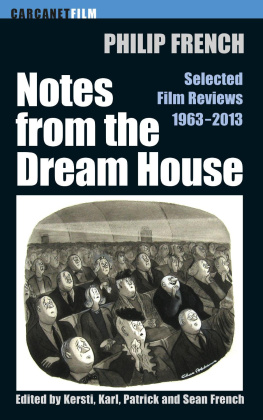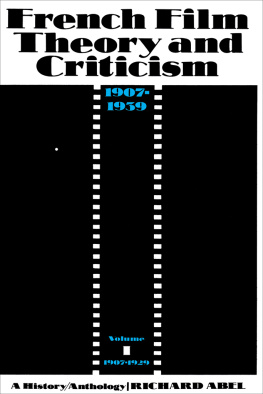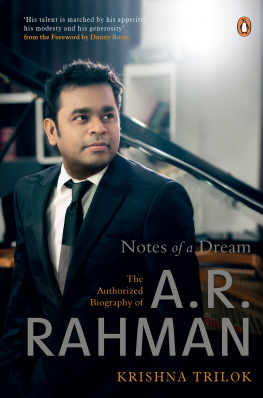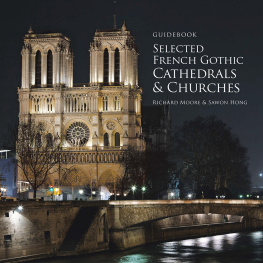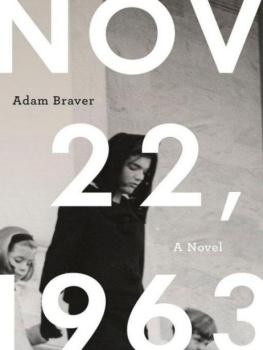French Karl - Notes from the Dream House: Selected Film Reviews 1963-2013
Here you can read online French Karl - Notes from the Dream House: Selected Film Reviews 1963-2013 full text of the book (entire story) in english for free. Download pdf and epub, get meaning, cover and reviews about this ebook. City: Chicago, year: 2019;2018, publisher: Carcanet Press Ltd, genre: Detective and thriller. Description of the work, (preface) as well as reviews are available. Best literature library LitArk.com created for fans of good reading and offers a wide selection of genres:
Romance novel
Science fiction
Adventure
Detective
Science
History
Home and family
Prose
Art
Politics
Computer
Non-fiction
Religion
Business
Children
Humor
Choose a favorite category and find really read worthwhile books. Enjoy immersion in the world of imagination, feel the emotions of the characters or learn something new for yourself, make an fascinating discovery.
- Book:Notes from the Dream House: Selected Film Reviews 1963-2013
- Author:
- Publisher:Carcanet Press Ltd
- Genre:
- Year:2019;2018
- City:Chicago
- Rating:5 / 5
- Favourites:Add to favourites
- Your mark:
- 100
- 1
- 2
- 3
- 4
- 5
Notes from the Dream House: Selected Film Reviews 1963-2013: summary, description and annotation
We offer to read an annotation, description, summary or preface (depends on what the author of the book "Notes from the Dream House: Selected Film Reviews 1963-2013" wrote himself). If you haven't found the necessary information about the book — write in the comments, we will try to find it.
French Karl: author's other books
Who wrote Notes from the Dream House: Selected Film Reviews 1963-2013? Find out the surname, the name of the author of the book and a list of all author's works by series.
Notes from the Dream House: Selected Film Reviews 1963-2013 — read online for free the complete book (whole text) full work
Below is the text of the book, divided by pages. System saving the place of the last page read, allows you to conveniently read the book "Notes from the Dream House: Selected Film Reviews 1963-2013" online for free, without having to search again every time where you left off. Put a bookmark, and you can go to the page where you finished reading at any time.
Font size:
Interval:
Bookmark:
Enter the dream-house, brothers and sisters, leaving
Your debts asleep, your history at the door:
This is the home for heroes, and this loving
Darkness a fur you can afford.
C. Day Lewis, Newsreel
- REVIEWS/ARTICLES
After Philip Frenchs funeral in November 2015, the mourners came back for drinks at his house. A couple of younger film critics asked, a little nervously, if they might visit his cinema which theyd heard talk about. It was worth seeing. Theres a large screen, which descends with a buzz at the touch of a button in front of the windows, cutting out the daylight. The walls and the ceiling are painted a matt dark blue, the ceiling lights create a starlight effect, and there are old-fashioned lamps on either side of the screen. The walls are lined with shelves of videos, DVDs and Blurays. The videos are relics of a near-defunct technology, but Philip was reluctant to dispose of them. Many were otherwise unobtainable rarities taped at strange times of the night from obscure broadcasts.
Of course, most of Philips movie-watching took place in Soho viewing theatres. He tended to use his home cinema for checking details or to revisit old movies he had first seen as a child at matinees in Liverpool, as a schoolboy in Bristol, in troop screenings in the Canal Zone, at Oxford, or in long-closed or long-demolished cinemas like the Academy on Oxford Street, the Tolmer in Camden, or the Astoria in Finsbury Park.
He wrote his reviews in a back room of his house crammed with movie reference books and also, oddly enough, a large collection of poetry. In the 1960s his working desk accommodated a portable Olivetti typewriter, an ashtray, a packet of cigarettes, and, as often as not, a gin and tonic. For the French family the early articles in this book will always be seen through a blue haze of smoke accompanied by the clacking of two-finger typing. By the early seventies, the gin and tonic had gone. By the mid-seventies the cigarettes had gone as well. And by the late-ish 1980s the Olivetti had, finally, joined them. But Philip was never entirely comfortable in the world of the Amstrad 8256, the MacBook and the Internet Movie Database. For him, journalism should be something in the style of Cary Grant and Rosalind Russell in His Girl Friday. And what need of the IMDb when you have Philip Frenchs brain?
He wrote his first film reviews as an Oxford undergraduate in 1953. He filed his final one a DVD re-issue of The Ladykillers on the evening of Monday 26 October 2015, the day before he died. From 1959, his day job was producing radio programmes at the BBC, but during the 1960s and 1970s he regularly reviewed films, mostly for the Times and the Observer. He was more than once offered the job of Observer film critic, but the BBC management frowned on extra-curricular employment. Finally, in 1978, they relented, and he wrote for the Observer regularly until his eightieth birthday in summer 2013.
As Observer film critic, Philip reviewed the weekly releases as well as screenings of films on TV and, in later years, video and then DVD re-issues. He also wrote obituaries, thematic articles, book reviews and interviews. His writings for the Observer during this period amounted to well over three million words. His reviews from the previous couple of decades come to another few hundred thousand. So the selection in this book about 120,000 words represents a small fraction of his output.
What to include? What to leave out? We could easily have compiled an anthology entirely of his essays on westerns to accompany his 1974 book on the genre. There is no such thing as an uninteresting western, was one of his dicta, and there was certainly never a Philip French review of a western that wasnt engaged, and few that were not combative. He felt a particular pleasure (one might almost say duty) in defending maligned, commercially challenged westerns like Heavens Gate or, more recently, the Gore Verbinski-Johnny Depp version of The Lone Ranger. His reviews of the movies of Woody Allen, Clint Eastwood, the Coen brothers, Walter Hill, John Boorman, Ken Loach, Mike Leigh and many others are like extended works of reflection, dialogues with both his own past views and the filmmakers developing careers. Only some of this can be suggested in an anthology of this scope.
Could there be room for some of his exchanges with his readers, not always amicable? He began his review of Richard Lesters 1979 movie Butch and Sundance: The Early Days, by lamenting the term prequel that was used to describe it, concluding, Hopefully only those not disinterested in language will be offended. A schoolteacher wrote to point out that while correcting someone elses poor English, Philip had made two mistakes himself, and the teacher was using this in his class as an example of illiteracy. Philip wrote back: Not to worry. You can use it in your class but as an example of misunderstood irony.
Philip had made a tentative start at preparing an anthology of his reviews and had thought of organising the material thematically. Reluctantly we decided against this. It is our view that this book shows Philip developing as a critic. The thirty-something writer of the earlier articles was very different, we feel more polemical perhaps) from the Philip French of the 2000s, with a thirty-year relationship with his readers and almost a lifetime of films, not to mention the decades of voracious reading and theatre-going and absorption in the visual arts.
This is not a potted history of the cinema. It is not an anthology of masterpieces. There are masterpieces reviewed here, but also minor films. We tried to choose films that covered the range of Philips interests and the scope of his life. Faced with the choice between two equally good reviews, we chose the more important film. But each review we picked struck us as in some way revealing, enticing, entertaining in itself.
This is not a systematic account of the cinema. But even so we hope that a particular idea of the movies emerges from these pages, and also the idea of a man. Robert Warshow, an American critic Philip much admired, once wrote: A man watches a movie, and the critic must acknowledge that he is that man. The reader of these reviews will come to know and recognise a man who grew up in provincial England, served in the army, studied at Oxford and in the United States, married a Swedish woman, had three sons, and spent his working life mainly at the BBC and the Observer. He was an old-fashioned liberal, a Labour supporter in the Clement Attlee/Nye Bevan tradition, a critical friend of America and an opponent of totalitarianism in all its forms. Among many other things and, we hope, many other pleasures this collection may serve as the memoir Philip French never quite got around to writing.
Kersti, Karl, Patrick and Sean French
WARNING dont go alone, take a brave, nerve-less friend with you, the advertisements advise would-be patrons of a new Hammer double bill. The main feature is Maniac, accompanied however by Joseph Loseys The Damned, to which In the Picture drew attention last week.
Losey, an American who has worked in this country since the early fifties, has directed a film that would have been a credit to Britain if shown at Cannes as it is, it hasnt even been shown to the British press.
The Damned is set on the Dorset coast between Weymouth and Portland and involves five main characters Bernard (Alexander Knox), the Scots head of a top secret Government research establishment, Freya Nilsson (Viveca Lindfors), a Swedish sculptress who rents a cottage from him, King (Oliver Reed), the leader of a teenage motorcycle gang, his sister (Shirley Anne Field) and an American visitor (Macdonald Carey).
Font size:
Interval:
Bookmark:
Similar books «Notes from the Dream House: Selected Film Reviews 1963-2013»
Look at similar books to Notes from the Dream House: Selected Film Reviews 1963-2013. We have selected literature similar in name and meaning in the hope of providing readers with more options to find new, interesting, not yet read works.
Discussion, reviews of the book Notes from the Dream House: Selected Film Reviews 1963-2013 and just readers' own opinions. Leave your comments, write what you think about the work, its meaning or the main characters. Specify what exactly you liked and what you didn't like, and why you think so.

